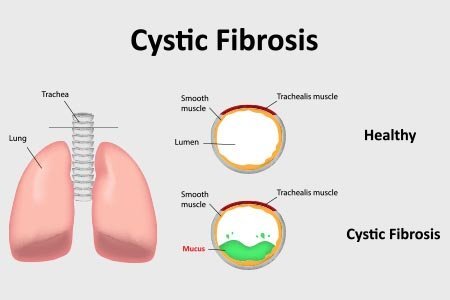Cystic Fibrosis
What is Cystic Fibrosis ?
Cystic fibrosis (CF) is a condition passed down in families that causes damage to the lungs, digestive system and other organs in the body. CF affects the cells that make mucus, sweat and digestive juices. These fluids, also called secretions, are usually thin and slippery to protect the body’s internal tubes and ducts and make them smooth pathways. But in people with CF, a changed gene causes the secretions to become sticky and thick. The secretions plug up pathways, especially in the lungs and pancreas.
CF gets worse over time and needs daily care, but people with CF usually can attend school and work. They often have a better quality of life than people with CF had in past decades. Better screening and treatments mean that people with CF now may live into their mid- to late 50s or longer, and some are being diagnosed later in life.
Symptoms
- A persistent cough
- Wheezing
- Exercise intolerance
- Repeated lung infections
- Inflamed nasal passages
- Recurrent sinusitis
- Foul-smelling, greasy stools
- Poor weight gain and growth
- Intestinal blockage
- Chronic or severe constipation
Cause
In cystic fibrosis, a change in a gene causes problems with the protein that controls the movement of salt and water in and out of cells. This gene is the cystic fibrosis transmembrane conductance regulator (CFTR) gene. It affects the cells that make mucus, sweat and digestive juices. When the CFTR protein doesn’t work as it should, the result is thick, sticky mucus in the respiratory, digestive and reproductive systems, as well as extra salt in sweat. Changes in the CFTR gene that cause CF are divided into several different groups based on the problems they cause. Different groups of gene changes affect how much CFTR protein is made and how well it works. To have cystic fibrosis, children must get one copy of the changed CFTR gene from each parent. If children get only one copy, they won’t develop CF. But they will be carriers and could pass the changed gene to their own children. People who are carriers may have no symptoms of CF or a few mild symptoms.
Risk Factors
Because cystic fibrosis is a condition passed down in families, family history is a risk factor. CF occurs in all races, but it’s most common in white people of Northern European ancestry. Because it’s less common in people who are Black, Hispanic, Middle Eastern, Native American or Asian, this might lead to a much later diagnosis. A late diagnosis may cause worse health issues. Early and effective treatment can improve your quality of life, prevent complications and help you live longer. If you’re a person of color and have symptoms that could be CF, talk to your healthcare professional so that you can get tested for CF.

When to see a Doctor
If you or your child has symptoms of cystic fibrosis — or if someone in your family has CF— talk with your doctor about testing for the disease. Consult a physician who is knowledgeable about CF. Cystic fibrosis requires consistent, regular follow-up with your doctor, at least every three months. Contact you doctor if you experience new or worsening symptoms, such as more mucus than usual or a change in the mucus color, lack of energy, weight loss, or severe constipation. Seek immediate medical care if you’re coughing up blood, have chest pain or difficulty breathing, or have severe stomach pain and distention.
